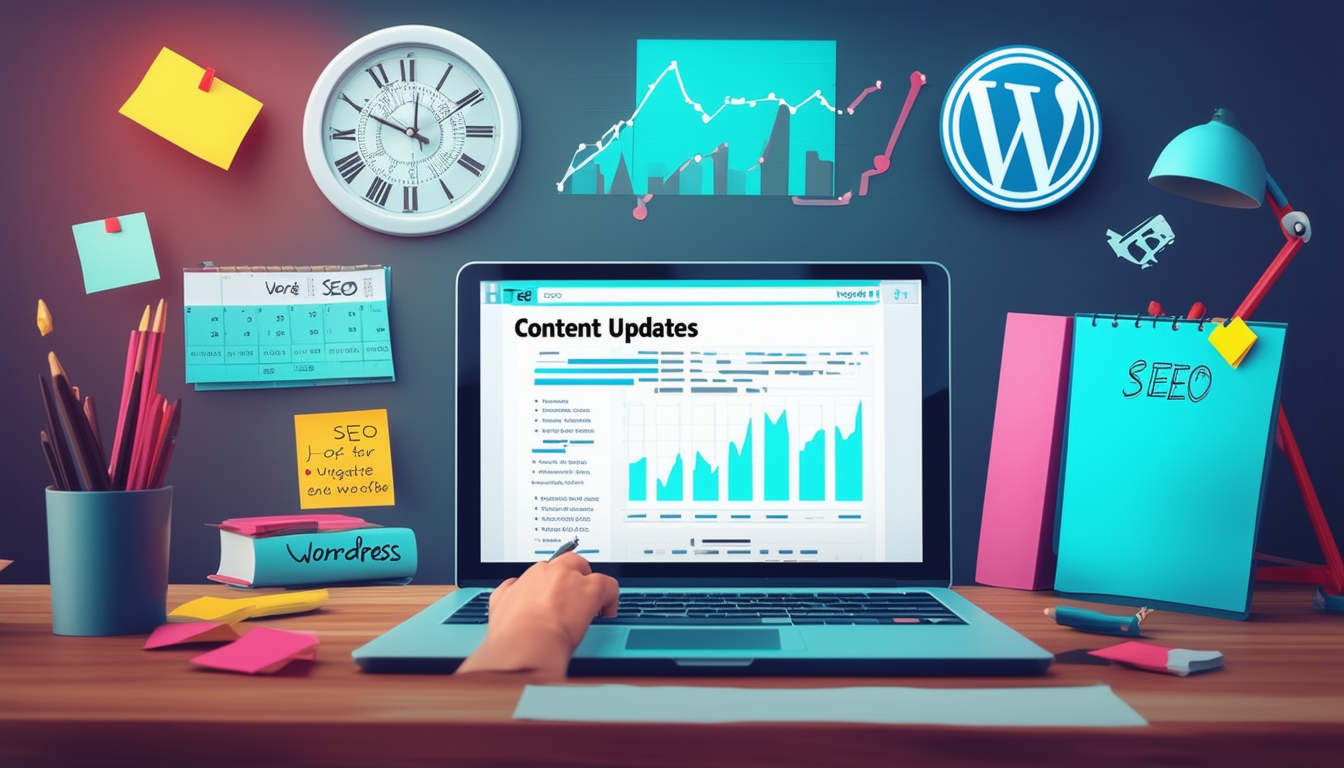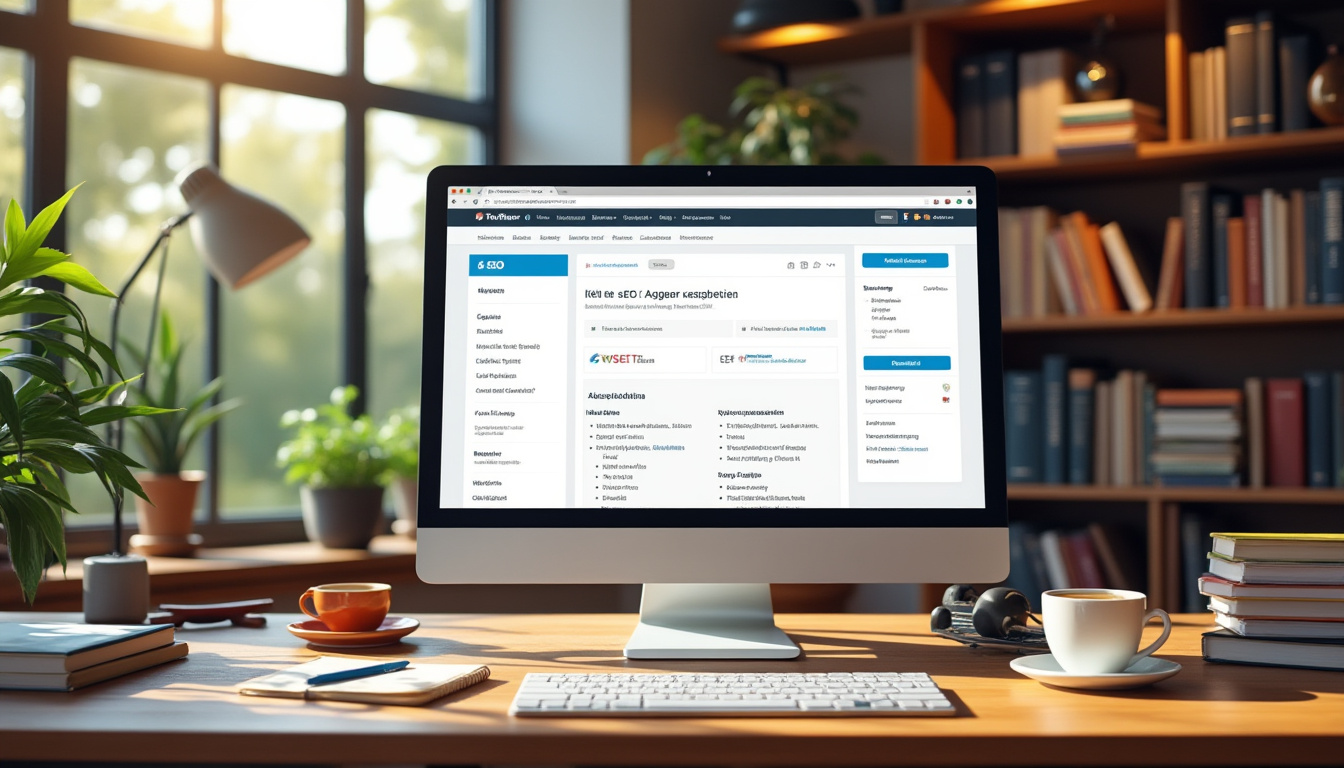Updating your website content is essential for enhancing SEO performance in WordPress. Regular content refreshes provide search engines with new and relevant information, which can significantly impact search rankings. Fresh content not only helps in indexing sites more frequently but also keeps existing posts aligned with current SEO best practices. Moreover, optimizing old posts by refining keywords and enhancing their relevance can drive increased traffic and authority to your website. Ultimately, engaging, informative content that is regularly updated fosters better visibility on search engines, making it a critical aspect of any successful digital marketing strategy.
In the ever-evolving landscape of digital marketing, the need for fresh, relevant content cannot be overstated. Regularly updating content on your WordPress site is key to maximizing your SEO strategy. This article explores the significance of content updates in SEO, demonstrating how they improve search engine rankings, enhance user experience, and establish authority in your niche. By implementing a systematic approach to content updates, WordPress users can create a pathway to sustained online visibility and traffic growth.
The Importance of Fresh Content
Search engines like Google prioritize fresh content because it signals relevance and currency. A frequently updated website is more likely to be indexed by search engines, thereby increasing the chances of ranking well for various search queries. Fresh content acts as a magnet for search algorithms, offering new information and resources that fulfill users’ search intents. Consequently, when you update your WordPress content regularly, it plays a vital role in your site’s overall SEO performance.
How Regular Updates Benefit SEO
Updating content is not merely about adding new information; it’s also about improving existing content. When old posts are refreshed with current data, optimized keywords, and enhanced formatting, search engines take notice. Google rewards websites that demonstrate relevance and authority in their content. As a result, sites that continually refresh their content are likely to experience improved search rankings and increased organic traffic over time.
Optimizing Existing Content
Updating your website’s existing pages involves more than just adding a few sentences to the end of an article. It’s about conducting a thorough review of the post and making necessary adjustments that adhere to SEO best practices. Key strategies may include refining your keyword strategy, improving internal linking, and enhancing the content structure for better readability. These updates can provide your pages with a competitive edge, particularly in niche markets.
How to Conduct a Content Audit
A content audit serves as a foundation for effective updates. Begin by assessing your existing content to identify underperforming posts. Tools like Google Analytics can provide insights into which posts are receiving little traffic. Once you’ve identified these posts, consider revisiting and improving aspects such as keyword usage, content depth, and relevance. This systematic approach can significantly enhance your site’s SEO potential.
Keeping Up with SEO Trends
The digital marketing landscape is in constant flux. Search engine algorithms change frequently, often prioritizing different ranking factors. When you keep your content updated, you have an opportunity to adapt to these changes. It allows you to address trending topics within your niche, thereby boosting your relevance. The ability to stay current with SEO trends reinforces your site’s credibility and positions you as an authoritative voice in your field.
Leveraging User Feedback
User feedback is invaluable when refreshing content. Encourage visitors to leave comments or reviews on your posts and use this feedback to inform your updates. This can provide insight into what your audience finds valuable or confusing. By addressing their concerns and adjusting your content accordingly, you not only enhance user experience but also improve your SEO.Google emphasizes user experience as a significant ranking factor, making this an essential consideration.
Revising Content for Engagement
Another aspect of updating content is enhancing engagement. Users are more likely to stay on your site and engage with your content if it is relevant and informative. Updating old blogs with fresh statistics, new quotes, or updated images can breathe new life into what may have been stale content. Improving the overall user experience can lead to lower bounce rates and higher time-on-site metrics, which are critical for SEO.
Utilizing Visual Elements
Incorporating visual elements into updated content can significantly improve user engagement. Infographics, videos, and images can make the content more appealing and digestible. Additionally, optimizing these visual elements with proper alt texts can further enhance your SEO strategy. Your WordPress platform allows for easy integration of these elements, making the process seamless.
Impact on Social Shares
When content is updated and engaging, the likelihood of it being shared on social media platforms increases. A post that resonates with readers is often shared, resulting in greater visibility. Social shares can drive organic traffic, signaling to search engines that your content is relevant and valuable. By continually updating your high-performing content, you create more opportunities for it to be shared, further boosting its SEO potential.
Integrating Social Media Strategies
To maximize the impact of content updates, integrate social media strategies into your overall content plan. Share your updated posts across various platforms to reach a broader audience. Each share can lead to more backlinks and traffic, which can further boost your SEO rankings. Having social share buttons on your WordPress site makes it easy for readers to share your content, enhancing your outreach efforts.
The Role of Internal Linking
Internal linking is a powerful SEO tactic that becomes even more effective when content is updated. By linking to newly updated content within your posts, you enhance site navigation while supplying context and relevance. Search engines recognize internal links and use them to establish the hierarchy of your pages. Regular updates provide a perfect opportunity to reassess and strengthen your internal linking strategy.
Creating a Logical Link Structure
When updating content, ensure that your internal links create a logical structure for visitors. This means linking from less trafficked pages to your highest-ranking content, which can help distribute page authority. A well-structured internal linking system allows search engines to crawl your site more efficiently, improving your overall SEO prospects.
Improving Mobile Optimization
As mobile usage continues to rise, ensuring that your content is mobile-friendly is essential. Content updates can include making adjustments to ensure text is easily readable on smaller screens, images are responsive, and navigation is simple. Google prioritizes mobile optimization as a ranking factor, meaning that keeping your content updated for mobile users can significantly impact your SEO.
Utilizing WordPress Features for Mobile
WordPress offers various themes and plugins designed for optimal mobile performance. Consider revisiting your site’s design and adjusting it as necessary during content updates. This not only enhances user experience for mobile visitors but also ensures that you comply with Google’s mobile-first indexing strategy.
Regular content updates are indispensable for maintaining the SEO health of your WordPress site. They boost visibility, enhance user experience, and cultivate authority within your niche. By adhering to SEO best practices and leveraging tools at your disposal, your WordPress site can thrive in search engine rankings. Moreover, as you continuously engage with users and adapt to trends, you’ll foster a vibrant online presence.
For further reading on the impact of regular content updates, check out these resources:
5 Reasons Why Fresh Content is Critical for Your Website,
Is Updating Website Content More Frequently Better for SEO?,
Is it More Important to Update Existing Content?,
Optimize Your WordPress Blog for Better SEO Performance, and
How to Update Website Content for Better SEO.

Keeping your website’s content fresh is essential for enhancing its search engine optimization (SEO) performance, especially when using platforms like WordPress. Regular content updates increase your site’s relevance, improve its rank, and ultimately attract more visitors. This article delves into the various reasons why updating content is necessary and how it can significantly impact your site’s visibility on search engines.
Search Engines Favor Fresh Content
Search engines, particularly Google, prioritize fresh content in their algorithms. Websites that continuously provide updated information are seen as more relevant and reliable sources for users. An frequently updated website offers a haven for fresh content and new information, making it more likely to rank higher in search results. This is one of the primary reasons why including regular updates on your WordPress site is crucial for effective SEO.
Enhancing User Experience and Engagement
Content updates not only benefit search engines but also enhance the user experience. Visitors are more inclined to engage with a website that provides current information and new perspectives. An updated site can lead to lower bounce rates and increased time spent on pages, both of which are positive indicators for SEO. Keeping your content fresh and engaging ensures that users return, reinforcing their trust in your site as a valuable resource.
Implementing SEO Best Practices
Regular updates present an opportunity to refine and optimize existing content. By fine-tuning keywords, improving meta descriptions, and ensuring compliance with SEO best practices, you enhance your chances of ranking better on search engines. An up-to-date page signifies to search engines that you’re continuously maintaining the quality and relevance of your material. For more detailed strategies, consider exploring practices outlined in articles about updating website content for SEO.
Staying Relevant in Your Niche
By frequently updating old posts and integrating new trends or data, you position your website as a leader in your niche. When your content reflects the latest developments and discussions in your industry, it attracts backlinks and mentions from other sites, further boosting your SEO efforts. To understand the importance of revisiting and updating content, check out the discussion on updating old posts for SEO.
Content Quality Over Quantity
In the world of content, quality triumphs over quantity. While it’s important to update often, ensuring that your updates are meaningful and informative is paramount. Focus on creating high-quality content that resonates with your audience. Maintaining a balance between fresh updates and informative details is key to meeting search engine algorithms and enhancing your site’s credibility.
The Impact of Site Speed on SEO
Content updates can also influence your site’s loading speed. Keeping your website optimized is crucial for user experience, and faster loading speeds can significantly impact your search rankings. By ensuring your updated content does not slow down your site, you are actively improving your SEO. For insights on this aspect, refer to resources about site speed and SEO.
In summary, updating your content is essential for optimizing your WordPress site for SEO. It enables better visibility in search engine results, improves user engagement, adheres to SEO best practices, maintains niche relevance, and ensuring quality content. By following these guidelines, you can enhance both the usability and effectiveness of your website.
Importance of Content Updates for SEO in WordPress
| Aspect | Description |
| Search Engine Crawling | Updated content encourages search engines to crawl your site more frequently. |
| Relevance | Fresh content ensures your website stays relevant to current topics and trends. |
| User Engagement | Regular updates keep visitors returning, increasing chances of engagement. |
| Keyword Optimization | Refreshing content allows for updated keyword strategies to enhance SEO. |
| Domain Authority | Consistent updates can improve your domain authority by signaling active maintenance. |
| Improved Rankings | Search engines favor sites that provide up-to-date and informative content. |
Regularly updating your website’s content is essential for improving its search engine optimization (SEO) and visibility. This practice not only attracts more visitors but also helps maintain your site’s relevance in a fast-paced digital landscape. In this article, we will explore the reasons why content updates are vital for your WordPress site and how they can positively impact your SEO efforts.
Fresh Content Keeps Your Site Relevant
Search engines like Google prioritize fresh content when delivering search results. By updating existing articles or adding new ones, you signal to search engines that your site is active. Fresh content provides a way for search engines to crawl and index your pages more frequently. This can lead to higher rankings and improved visibility in search results. Regular updates ensure that your audience always finds the most relevant information, reinforcing the credibility of your website.
Improving Keyword Optimization
As the digital landscape evolves, so do keyword trends and user interests. Updating your content allows you to refine your keyword usage, ensuring that it aligns with current search behaviors. This process involves researching trending keywords within your niche and incorporating them into your content. By doing so, you can better target your audience and enhance the likelihood of your site appearing in search results for those terms.
Revising Old Content
While creating new content is essential, paying attention to older posts can have significant benefits. Existing articles may still rank well but could use a refresh to enhance their effectiveness. Updating old posts allows you to add new insights, images, or data, keeping it informative and comprehensive. This also encourages visitors to revisit your site, leading to increased engagement and potentially lower bounce rates, which are favorable signals to search engines.
Boosting User Experience
Quality content goes hand-in-hand with user experience. When you update your content, you can enhance its readability and engagement value. This includes improving formatting, adding images, and ensuring the information is clear and useful. A better user experience can lead to more page views, longer sessions, and an overall reduction in bounce rate. These behavioral metrics are crucial for SEO, as they indicate to search engines that users find value in your content.
Aligning With SEO Best Practices
Updating content is an opportunity to align your site with SEO best practices. Incorporating meta tags, optimizing images, and utilizing internal linking strategies can greatly enhance your overall SEO strategy. By evaluating your existing content and making necessary adjustments, you can ensure that it adheres to the latest guidelines established by search engines, ultimately driving more organic traffic to your site.
Encouraging Social Sharing and Backlinks
Fresh content is more likely to be shared across social media platforms and attract backlinks from other websites. When you update your articles, they become more shareable due to their relevance and updated information. This not only helps increase your site’s visibility but also builds authority in your niche. Achieving a greater number of backlinks can positively influence your site’s domain authority, which is a crucial factor in improving your rankings on search engines.
In summary, keeping your WordPress site updated with fresh and relevant content is a key strategy for improving your SEO. From boosting rankings and enhancing user experience to aligning with best practices, the advantages of content updates are undeniable. Embracing a consistent content update strategy can lead to long-term sustainability and growth in your website’s visibility.
Frequently Asked Questions About Content Updates for SEO in WordPress
Why are content updates important for SEO? Content updates are essential for improving your website’s visibility on search engines. Fresh content allows search engines to crawl your site more frequently, which can lead to better rankings.
How does updating old content benefit my WordPress site? Regular updates to existing content can enhance its relevance and accuracy, making it more appealing to both search engines and users, thereby potentially increasing traffic.
Is it better to create new content or update existing content? While creating new content is important, updating existing content can maximize the value of what you already have. Search engines appreciate when outdated posts are refreshed with new information.
What are some best practices for updating content? Focus on refining keywords, aligning with current SEO practices, and keeping the content informative and engaging to improve overall site performance.
How often should I update my website content for optimal SEO results? Regular updates are recommended, with many experts suggesting a review of your content every few months to ensure it remains relevant and effective.
Does fresh content really impact search engine rankings? Yes, search engines like Google favor websites that consistently publish fresh content, which can lead to improved rankings and increased traffic.
Can I just change the date on an old post instead of updating it? Simply changing the date is not advisable; it’s important to genuinely update the content to maintain its value for readers and search engines alike.
What types of content should I focus on updating? Prioritize high-traffic pages and posts that are outdated or have lower engagement metrics, as improving these can significantly boost your site’s performance.









